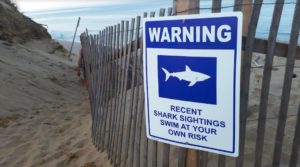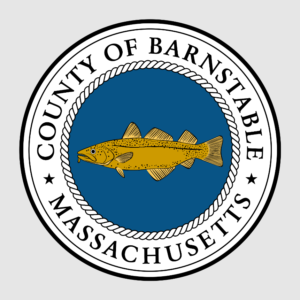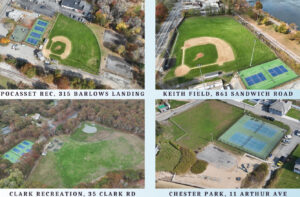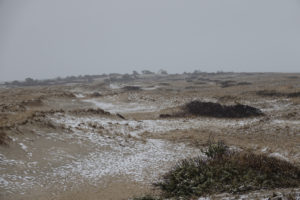 WELLFLEET – Outer Cape towns have been collaborating in recent months to prepare for the 2019 summer tourist season as the memory of two shark attacks, one of which was fatal, still remains fresh in the minds of beachgoers.
WELLFLEET – Outer Cape towns have been collaborating in recent months to prepare for the 2019 summer tourist season as the memory of two shark attacks, one of which was fatal, still remains fresh in the minds of beachgoers.
Last year, the Outer Cape was struck by two shark attacks in one month. On August 15, a 61-year-old New York man was bit at Long Nook Beach in Truro and was rushed to a Boston hospital in serious condition. He has since recovered.
Exactly one month later, on September 15, 26-year-old Arthur Medici, of Revere, was fatally attacked while surfing at Newcomb Hollow Beach in Wellfleet. He was pronounced dead upon arrival to Cape Cod Hospital. It was the first fatal shark attack in Massachusetts since 1936, when a shark killed a man in Mattapoisett.
On Wednesday, the Town of Wellfleet held a meeting with the Woods Hole Group to discuss a proposed shark and human mitigation alternatives analysis project.
“We’re looking to have them analyze existing alternatives to shark mitigation that are out there right now, give us an idea of what works and what doesn’t work and what has a better chance of improving in means of improving safety, and give us an unbiased look at all the other alternatives that are out there,” Wellfleet Town Administrator Dan Hoort explained.
The meeting brought together town managers and public safety officials from the towns of Chatham, Orleans, Eastham, Wellfleet, Truro, and Provincetown, along with representatives from the Atlantic White Shark Conservancy, the Cape Cod National Seashore, the Cape Cod Chamber of Commerce, and Representative Sarah Peake’s Chief of Staff.
The group discussed implementing actionable items to area beaches in 2019 to minimize the threat of an attack, and to better respond to attacks.
Improving communications at the beaches by installing emergency call boxes, expanding the presence of lifeguards, increasing the number of Emergency Medical Technicians on beaches, providing first-aid training for community members and staff, reducing emergency response time to attacks, continuing public education and outreach and expanding white shark research were discussed by the group.
“What we’re trying to do at this time is improve our reaction if there is a shark interaction at one of our beaches. That means buying a vehicle, through town meeting authorization, that will allow us to drive to the beach, put somebody onto a stretcher and be able to drive them back off of the beach. Right now, with the terrain here in Wellfleet, you have to carry somebody up the beach, and in a time of emergency every second matters,” Hoort said.
“We’re also looking at installing call boxes at all of our parking lots, so that if you have an emergency on the beach and you can’t get cell reception, you know exactly where you can go.”
The focus of discussion was shark and human mitigation alternatives, a collection of strategies attempted or implemented in different areas of the world and proposed by the community during public forms.
The Woods Hole Group will be undertaking an independent review of emerging technologies and strategies by analyzing all proposed alternatives.
The list of alternatives to be analyzed include:
Tech-based Alternatives
- Tagging (Acoustic & Satellite)
- Real-Time Alert (App-based, Alarm-based)
- Visual Detection (Drones, Balloons, Spotter Plane, Towers)
- Remote Detection (Buoy-based Sonar, Artificial Intelligence-Machine Learning)
- Shark repellents (Magnetic / Electric / Acoustic Deterrent, including Wearable or, Surfboard-Mounted Technology, Orca recordings)
- Adaptive Camouflage (Boards, Wetsuits)
Barrier-based Alternatives
- Rigid Plastic Mesh Enclosures
- Netted Enclosures
- Bubble ‘Nets’
- Simulated Kelp Forests
- Magnetic Post Array
Biological-based Alternatives
- Shark and / or Seal Culling, Indigenous Harvest
- Seal Contraception
- (Smart) Drum Lines
- Chemical Repellants, including substances that mimic the smell of dead sharks to repel sharks and dead seals to repel seals
Human Behavior
- Risk-based decision making
The group is seeking additional public feedback to ensure that all strategies are considered prior to the project start date.
While the study is beginning months before the tourist season kicks off on Cape Cod, Hoort said it will most likely be completed by the end of the summer.
“We run the risk of putting something into our waters and letting people think that they’re safer, and if it doesn’t make them safer we’ve done them a disservice by moving forward with something that isn’t really going to work to make them safer in the water,” Hoort said.
“So, we want to make sure that we do this right. We want to make sure we do this as quickly as possible, but the primary concern is to do it right.”
The Woods Hole Group shark and human mitigation alternatives analysis project is scheduled to begin on Friday.
Once complete, the findings of the study will be shared with the public and decisions to implement strategies will be made at the town level.
By TIM DUNN, CapeCod.com News Center






















